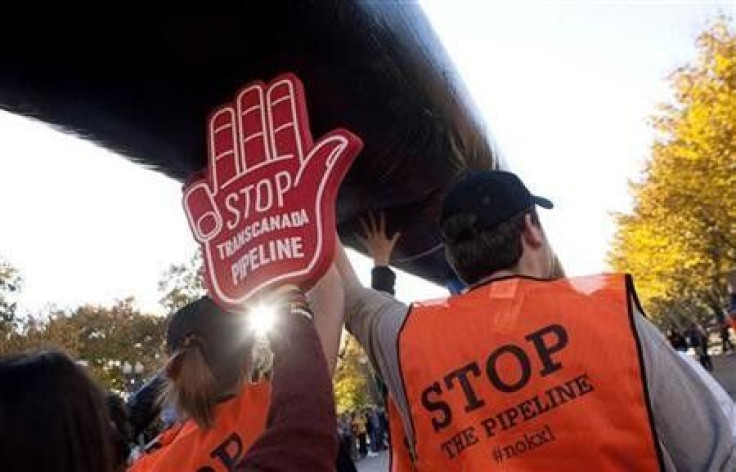U.S. seeks new Keystone pipeline route

WASHINGTON (Reuters) - The United States said on Thursday it will study a new route for the Keystone XL Canada-to-Texas oil pipeline, delaying any final approval beyond the U.S. 2012 election and sparing U.S. President Barack Obama a politically risky decision during an election year.
The decision was a victory for environmental groups, who say producing oil sands crude emits large amounts of greenhouse gases. It was a blow to TransCanada Corp, which planned to build and operate the conduit.
The State Department said that based on past experience a study of the new route could be completed as early as the first three months of 2013, well past the November 6 2012 U.S. presidential election.
Department officials, who spoke on condition of anonymity, said the new study a would examine a route that avoids the environmentally sensitive Sand Hills of Nebraska.
The U.S. State Department had previously said it hoped to make a decision on the $7 billion project by the end of this year.
Analysts have said a long delay could kill the pipeline project because it would cause shippers and refiners to look for alternative routes to get Canadian oil sands crude.
The White House denied that the decision to look into a new route was politically motivated.
While the decision may hurt Obama with industry and could allow Republicans to argue that he has cost the nation jobs, it also may shore up his support from environmentalists, an important constituency for Obama and his fellow Democrats.
Politically it's an effort to avoid antagonizing either side of the issue, said David Pumphrey, a senior fellow at the Center for Strategic and International Studies and former Energy Department official.
Both sides likely to be disappointed, but since it's impossible to calculate the most damaging outcome, better to buy time, Pumphrey said.
National Wildlife Federation President Larry Schweiger called the move a major victory for environmentalists but that they would keep up the fight against oil sands.
The president should know that nothing that happened today changes our position -- we're unequivocal in our opposition, said Bill McKibben the leader of recent protests at the White House against the pipeline that drew thousands of opponents.
If this pipeline proposal reemerges from the review process intact we will use every form of nonviolent civil disobedience to keep it from ever being built, he said.
TransCanada shares were down 30 Canadian cents to C$40.28 by midafternoon on the Toronto Stock exchange, in line with the market. Rival Enbridge Inc, which stands to benefit should Keystone XL be canceled as shippers move Canadian oil onto its U.S. pipeline network, fell a similar amount.
Charles Ebinger of the Brookings Institution think tank in Washington said the decision would hurt U.S.-Canadian relations at least temporarily given Canada's strong backing for the pipeline and was probably a mixed bag for Obama politically.
It will set back our relations with Canada -- not irreparably because, of course, we have so many areas of common interest, he said.
The Keystone XL project is seen as the most important North American oil pipeline plan for several decades and was strongly championed by Canadian officials.
While U.S. officials said that politics played no role in its decision, it was clear Republicans were likely to use it against Obama.
It shows, again, that they are letting environmental ideology trump job creation and economic development, said Republican political consultant Matt Mackowiak, anticipating a likely line of attack against Obama. He really has demonstrated that he is beholden to the environmental lobby.
(Additional reporting by Jeff Mason and Ayesha Rascoe in Washington and by Jeffrey Jones and Scott Haggett in Calgary; Editing by David Gregorio)
© Copyright Thomson Reuters 2024. All rights reserved.











